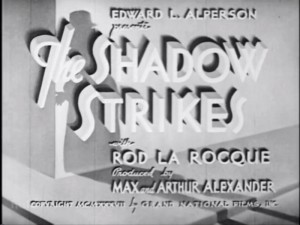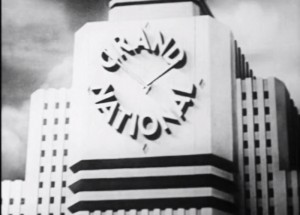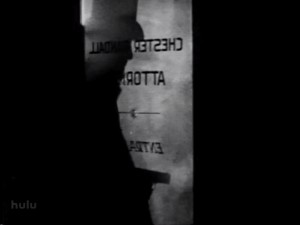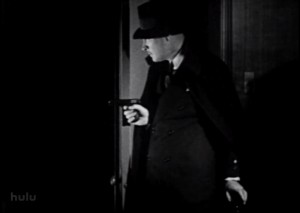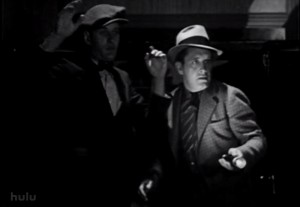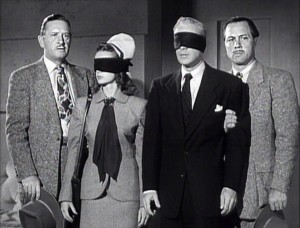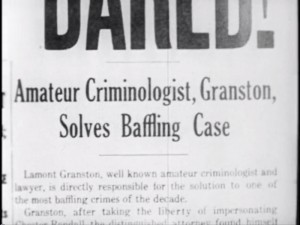So it looks as if this will be the last week of Origins, unless I find something extraordinary for next week. I almost didn’t find anything for today, but at the last minute, I grabbed this early Shadow film, since the masked men of the pulps were an influence on costumed superheroes generally, and the Shadow was an influence on Batman directly, and this film came out two years before Batman’s debut.
This is going to be a short entry, because The Shadow Strikes is frankly too boring to do a blow-by-blow recap. It’s mainly notable because it does what most superhero movies did before Superman: The Movie made you believe a man could fly in 1978: it unsupers the hero.
Superhero movies were never very numerous, and what comic book heroes did get adapted into movies generally got powered down. There were two reasons for this. Number one, special effects were both too crude and too expensive to do a superhero convincingly. So superheroes were generally confined to some unremarkable strength gags like lifting a car, or some easy flying effects.
But the second reason is just as important and often overlooked. Audiences weren’t ready to accept a comic book hero’s adventures. Kids and teens might eat up the outlandish adventure on the page, but try translating those fanciful costumes and crazy names into real people wearing real clothes and you found yourself in spoof territory, so you usually ended up with drastically depowered heroes fighting mobsters and assorted other crooks. It’s only in recent years that special effects have intersected with an audience ready to accept the heroes and villains at face value.
And so what we got all too often were mild potboilers like The Shadow Strikes, which eschews all of the Shadow’s interesting qualities. He has no shadow army of operatives, just a comedy relief butler/chauffeur. He uses no mind-clouding powers; he just wears a cape and counts on criminals to be stupid. He does not even wield dual .45’s.
But there were a few things worth noting in the movie, so let’s take a brief look. But first, your mark of quality:
If you put a gun to my head, I couldn’t name another Grand National picture. Anyway, the picture opens with an unnamed man examining a bullet with a magnifying glass. Through dialogue, we learn that it is the bullet that killed his father, and the man is obsessed with finding another to match it so he can identify his father’s killer. When asked to describe his father, he says,
“He was a great liar, Henry.”
Okay, actually he said “great lawyer,” but he was talking fast, and really, is there much difference between the two? And it is certainly interesting, isn’t it, that this film approaches the character of the Shadow from the angle of a man seeking to solve/avenge his father’s murder, and just two years later, another character would appear, much like the Shadow in many ways, who would also be motivated by the murder of his parents?
Anyway, when we see him next, he’s lurking outside a lawyer’s office, and wearing a familiar ensemble.
That first shot is nicely moody. There are actually a few good compositions in the film, but you’ll notice in the second shot that, though he has the Shadow’s signature slouch hat and cloak, he makes no effort to cover his face. He surprises a couple of mugs cracking the lawyer’s safe.
Wait a second, that guy on the right looks familiar. Let’s see…
Yeah, it’s Anton of the Spider Lady’s Fabulously Gay Duo in the Columbia serial Superman, who returned to play Luthor’s henchman Foster in Atom Man vs. Superman.
Anyway, the Shadow foils the safecrackers, but has to assume the identity of the lawyer to foil the police arriving on scene. And while playing the part of lawyer Chester Randall, he becomes embroiled in a web of murder and deceit revolving around a rich old man’s will. Â We are given the clue almost immediately of the killer’s identity, and it is the biggest cliche in the book.
But there is one final bit of interest. Though descriptions of the film says it stars Rod La Rocque as Lamont Cranston, that’s not entirely true. In fact, the real name of the man who is the Shadow is never mentioned in the film until the very end, and then only in a newspaper article. And it’s not Lamont Cranston.
Yeah. That about sums it up. Couldn’t be bothered to use the real name, and couldn’t be bothered to change it to something significantly different either.


